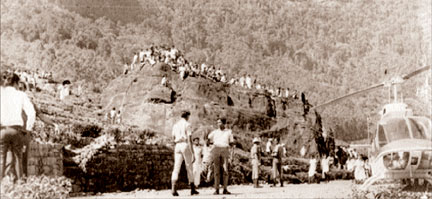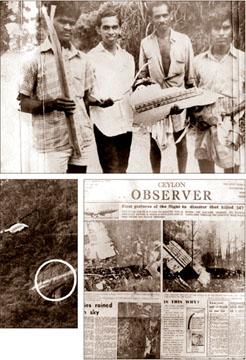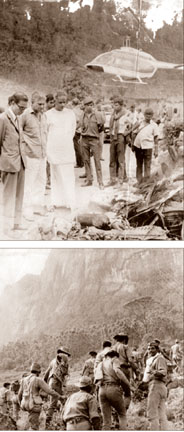|
observer |
|
|
|
|
|
OTHER LINKS |

|

|

|
|
Glimpse of History from ANCL Archives The most horrifying air tragedy in Sri Lanka: The crash on the 'Seven Virgins'
A McDonnel Douglas DC-8 55f airplane chartered by Garuda Indonesian Airways and operated by Martinair, Holland carrying 249 Mecca pilgrims and all Icelandic crew of 13 left Surabaya Airport in Indonesia about 17.30 hours (Sri Lankan time) for Jeddah with a scheduled technical stop at Bandaranaike International Airport. The plane was manufactured by the KIFIS (Kaliman Integrated Flight Information System) in USA. The plane was scheduled to arrive about 22.10 hours or 10.10 pm at the BIA. But before that, perhaps, due to gross miscalculation of the distance to the BIA under bad weather, the DC-8 crashed into 'Seven Virgins "killing all on board and reducing the aircraft to heaps of rubble.
In response to this message Approach Control passed on the weather information directing the aircraft to change over to Colombo Area Control on 119.1 Megahertz and obtain descent clearance. The message was acknowledged by the aircraft and contact was established with the Area Control.
The aircraft then contacted Approach Control. "Out of 7,000 for 6000 at a distance of one-four (14) miles out "was the message sent out by the aircraft. Approach Control acknowledged the message and cleared the aircraft to 2,000 feet with instructions to report "Kilo Alpha Tango (Katunayake non-directional beacon or airfield in sight). After the acknowledgement of this message and then onwards the communication with the aircraft was lost. Later eye-witnesses said that the aircraft was flying at extremely low altitude than normal over Castlereigh, Bogawanthalawa and Agrapatna. Apparently there was nothing unusual in the engine's sound and there was no indication of fire on board during the flight. The sound of the aircraft exploding, on its impact, was initially heard by residents close to the site of the crash and subsequently it was discovered the aircraft had crashed into the fifth mountain of the range "Seven virgins" killing all on board together with the aircraft which was reduced to pieces. After frantic efforts by the Approach Control to establish contact with the aircraft and in consultation with Area Control Colombo, the distress phase was initiated and a search and rescue operation was organized. It was recorded that a telephone message originated by a night telephone operator of the Hatton Post Office to the Approach Control Tower at BIA announcing a plane had crashed in Maskeliya was the first intimation of the plane crash.
The Republic of Indonesia was also informed as the passengers were Indonesian nationals returning from a pilgrimage to Mecca. W. A. Fournier representing the Netherlands and D. Suwardi representing Indonesia arrived in Sri Lanka the following day and visited the scene of the tragedy. The investigations concluded that the crash could have resulted from the crew descending the aircraft below the safe altitude based on incorrect identification of the plane's position and the airport. **** Response from a reader - It is indeed heartening to receive comments on "Nehru's visits to Sri Lanka" the first column of the series from ANCL Archives, by one of our informed readers Attorney-at-Law V. Vimalarajah which is an indication of the growing popularity of the column. I wish to reproduce here the relevant part of Vimalarajah's letter clearing the doubts over the boy that Jawaharlal Nehru greeted when he visited Jaffna. "I hasten to clear the cloud surrounding Nehru's mind in relation to the name of the school and the name of the young man with a bright face and shining eyes. In 1931 when Nehru came to Jaffna, I was not born and my father in his teens was a student at Vigneswara College, Karaveddi. My father who is no more was one of the students who greeted Nehru, having stopped his car. The young man with a bright face and shining eyes was the late K.C.Nadarajah the leading criminal lawyer in Colombo. He was also the Attorney General of Nigeria and a Supreme Court Judge of Bermuda. In 1931, he was just 13 years old and he was one among the first batch of students of Vigneswara College who did well in the London Matriculation Examination. The statement of Nehru regarding the school and the young man's utterance "I will not falter" was read out to us and explained at a function held by the school to felicitate K.C Nadarajah on his appointment as Manager, Vigneswara College." |
 Perhaps, the 262 passengers on board the ill-fated DC-8 Garuda
Indonesian Airways had not in their wildest dreams expected to end their
pilgrimage to the sanctified city of Mecca at the fifth mountain of the
range of hills in Maskeliya, popularly known as "Anjimalai" or "Seven
Virgins mountains" when it crashed into 'Seven Virgins' on December 4,
1974, making it Sri Lanka's worst ever air tragedy.
Perhaps, the 262 passengers on board the ill-fated DC-8 Garuda
Indonesian Airways had not in their wildest dreams expected to end their
pilgrimage to the sanctified city of Mecca at the fifth mountain of the
range of hills in Maskeliya, popularly known as "Anjimalai" or "Seven
Virgins mountains" when it crashed into 'Seven Virgins' on December 4,
1974, making it Sri Lanka's worst ever air tragedy.  According to reports available on the tragedy, the ill-fated DC- 8
aircraft had contacted International Airport Approach Control at
Ratmalana about 9.45 pm signalling that it was 130 miles away from BIA
at an altitude of 35,000 feet.
According to reports available on the tragedy, the ill-fated DC- 8
aircraft had contacted International Airport Approach Control at
Ratmalana about 9.45 pm signalling that it was 130 miles away from BIA
at an altitude of 35,000 feet.  The aircraft was brought down from 35,000 feet by Area Control and
handed over to Approach Control about 11 pm.
The aircraft was brought down from 35,000 feet by Area Control and
handed over to Approach Control about 11 pm.  Preliminary investigations were conducted into the crash in terms of
the Sri Lankan Navigation Regulations 266 (1). Subsequently the
Netherlands Authorities were informed of the accident and the
manufacturer of the aircraft, KIFIS in USA.
Preliminary investigations were conducted into the crash in terms of
the Sri Lankan Navigation Regulations 266 (1). Subsequently the
Netherlands Authorities were informed of the accident and the
manufacturer of the aircraft, KIFIS in USA. 







